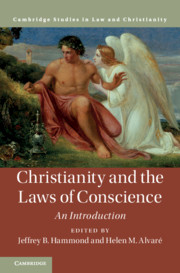Book contents
- Christianity and the Laws of Conscience
- Law and Christianity
- Christianity and the Laws of Conscience
- Copyright page
- Dedication
- Contents
- Contributors
- Acknowledgments
- Introduction
- Part I Themes in Understandings of Conscience in Christianity
- Part II Conscience According to Major Figures and Traditions
- 5 Conscience in the Early Church Fathers
- 6 St. Thomas Aquinas on Conscience
- 7 Reforming the Conscience
- 8 Toward a Theology of a Redeemed Conscience
- 9 Pierre Bayle
- 10 Freedom of Conscience and Its Right to Constitutional Protection
- 11 Jonathan Edwards on Conscience
- 12 Obeying God Rather Than Men
- 13 Mormonism and Conscience
- 14 Culture and Conscience in the Thought of Joseph Ratzinger, Pope Benedict XVI
- Part III Applied Topics in Law and Conscience
- Index
- References
8 - Toward a Theology of a Redeemed Conscience
from Part II - Conscience According to Major Figures and Traditions
Published online by Cambridge University Press: 12 June 2021
- Christianity and the Laws of Conscience
- Law and Christianity
- Christianity and the Laws of Conscience
- Copyright page
- Dedication
- Contents
- Contributors
- Acknowledgments
- Introduction
- Part I Themes in Understandings of Conscience in Christianity
- Part II Conscience According to Major Figures and Traditions
- 5 Conscience in the Early Church Fathers
- 6 St. Thomas Aquinas on Conscience
- 7 Reforming the Conscience
- 8 Toward a Theology of a Redeemed Conscience
- 9 Pierre Bayle
- 10 Freedom of Conscience and Its Right to Constitutional Protection
- 11 Jonathan Edwards on Conscience
- 12 Obeying God Rather Than Men
- 13 Mormonism and Conscience
- 14 Culture and Conscience in the Thought of Joseph Ratzinger, Pope Benedict XVI
- Part III Applied Topics in Law and Conscience
- Index
- References
Summary
Jeffrey Hammond outlines a biblical theology of conscience. A Christian conscience is an ever-growing, recalibrating capacity of the regenerated (converted) person. Then, through the sanctifying work of the Holy Spirit, the Christian can seek to fulfill the great commands of the New Testament: to love God and love the neighbor. Working out these commands involves judgment of what to do in any given situation. However, in making any difficult judgment, the Christian is always aided by the “still, small” voice of the Holy Spirit, counselors, prayer, and the certain knowledge that the conscientious decision will always line up with the will of God as revealed in the Word of God. The redeemed conscience is one that is both bound and freed. The Christian is bound to follow the moral instruction in the New Testament, but at the same time, she is also freed to do it. The redeemed conscience is one that judges and will be judged by the God who perceives the deliberations of all consciences. The Christian, however, sensitive to the Spirit in both deciding and acting, can rest upon her decisions with a sense of equanimity and peace, knowing that she has faithfully exercised her conscience.
Keywords
- Type
- Chapter
- Information
- Christianity and the Laws of ConscienceAn Introduction, pp. 152 - 169Publisher: Cambridge University PressPrint publication year: 2021

